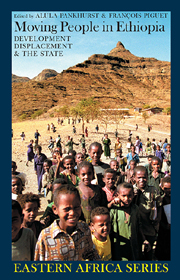Book contents
- Frontmatter
- Contents
- Acknowledgements
- Acronyms
- Glossary
- Notes on Contributors
- Preface: An Original Contribution to Country-wide Displacement Analysis
- Foreword by Alula Pankhurst & François Piguet
- Map
- Part I INTRODUCTION
- Part II THEORETICAL & INTERNATIONAL PERSPECTIVES
- Part III DEVELOPMENT-INDUCED DISPLACEMENT
- Part IV THE EXPERIENCE OF STATE-ORGANIZED RESETTLEMENT
- Part V THE DILEMMAS OF REFUGEES, RETURNEES & DISPLACED GROUPS
- 12 In the Mouth of the Lion
- 13 Returnees' Experiences of Resettlement in Humera
- 14 War, Displacement & Coping
- 15 From Young Soldiers to Adult Civilians
- Part VI CONCLUSION
- Bibliography
- Index
- EASTERN AFRICAN STUDIES
12 - In the Mouth of the Lion
from Part V - THE DILEMMAS OF REFUGEES, RETURNEES & DISPLACED GROUPS
Published online by Cambridge University Press: 05 April 2013
- Frontmatter
- Contents
- Acknowledgements
- Acronyms
- Glossary
- Notes on Contributors
- Preface: An Original Contribution to Country-wide Displacement Analysis
- Foreword by Alula Pankhurst & François Piguet
- Map
- Part I INTRODUCTION
- Part II THEORETICAL & INTERNATIONAL PERSPECTIVES
- Part III DEVELOPMENT-INDUCED DISPLACEMENT
- Part IV THE EXPERIENCE OF STATE-ORGANIZED RESETTLEMENT
- Part V THE DILEMMAS OF REFUGEES, RETURNEES & DISPLACED GROUPS
- 12 In the Mouth of the Lion
- 13 Returnees' Experiences of Resettlement in Humera
- 14 War, Displacement & Coping
- 15 From Young Soldiers to Adult Civilians
- Part VI CONCLUSION
- Bibliography
- Index
- EASTERN AFRICAN STUDIES
Summary
Introduction
Critiques of humanitarian assistance (Duffield 1995;Maren 1997; Timberlake 1986) have often been written from a distance. In contrast, the view here is close-up; the smells, sounds and sites of Kaliti, a camp for the displaced outside Addis Ababa, will engage the reader, often but not exclusively unpleasantly, with actual people, many of whom live in dire circumstances.
Humanitarian assistance almost always involves people from the developed nations offering assistance to impoverished people with different cultural traditions. Inherent in this work is a continual flow of moral conflicts. Decisions have to be made often affecting people's lives. The central motivation of the aid worker, trying to give to the needy, is not easy. It is often frustrating and difficult for well-meaning people to continue working in the field. A good deal of this has to do with how people who are receiving the assistance cope with their own life circumstances. I am a Western psychologist, my colleague an Ethiopian anthropologist. Together we discuss how our views, and the coping styles of the displaced in Kaliti, influenced our attempts to begin a mental health programme during our nearly two years of ethnographic fieldwork.
- Type
- Chapter
- Information
- Moving People in EthiopiaDevelopment, Displacement and the State, pp. 180 - 198Publisher: Boydell & BrewerPrint publication year: 2009



